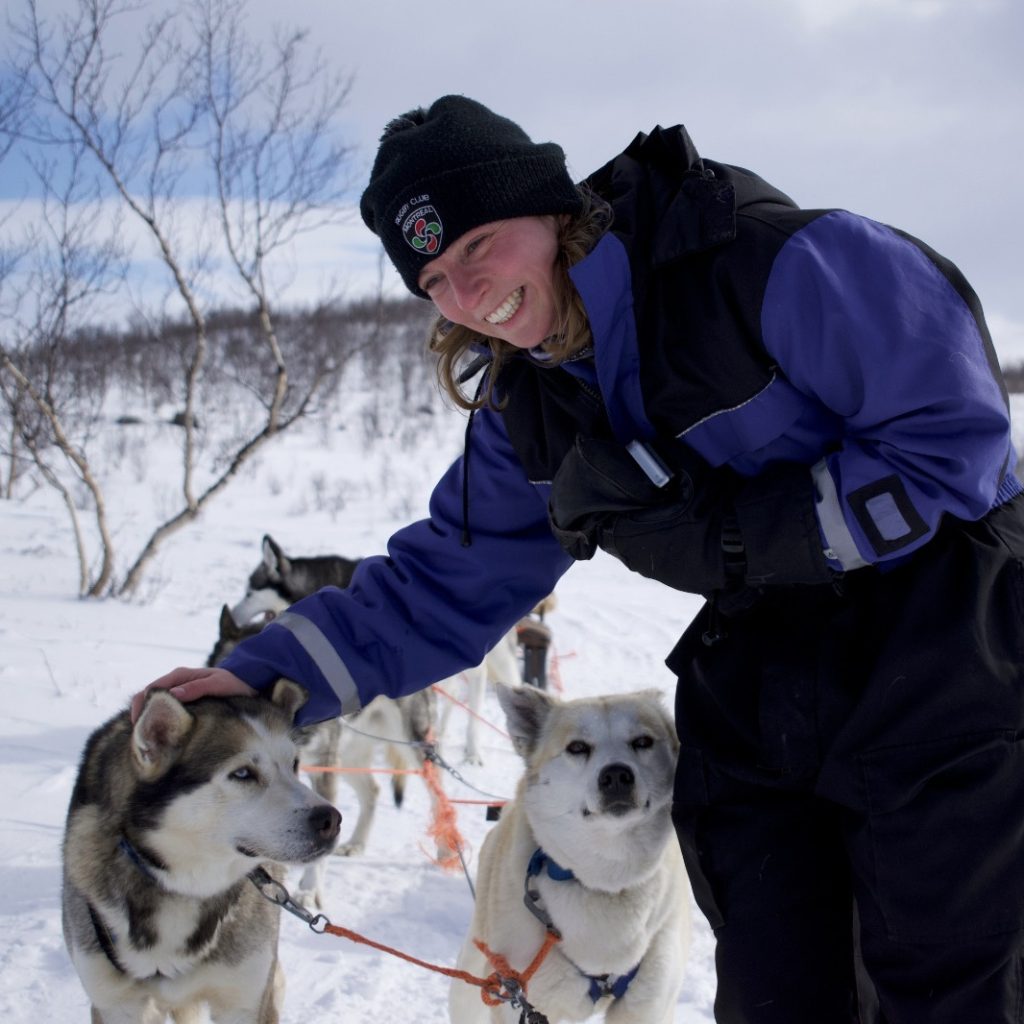Here you can find information about our ESRs.

ESR1 Kolja Kypke (UCPH): Tipping in the past and future climate
I completed an MSc in Applied Mathematics at the University of Guelph in Canada, where I focused on bifurcation theory and climate change. My research for this PhD is on the topic of abrupt transitions in the last glacial period, such as Dansgaard-Oeschger events, and investigating their mathematical nature. Alongside dynamical systems theory, a hierarchy of climate models provides insight into the physical processes that drive these transitions. (Supervisor, Peter Ditlevsen)
Contact: kolja.kypke@nbi.ku.dk

ESR2 Jade Ajagun-Brauns (UCPH): Climate response to greenhouse gas forcing
I obtained a 4 year integrated Masters in Physics in 2020 from the University of Manchester. During this PhD project I will simulate climate change during the past glacial cycle. The project will use a hierarchy of models to investigate different types of possible climate transitions that the Earth system has experienced during the last glacial cycle. (Supervisor, Peter Ditlevsen)
Contact: jade.brauns@nbi.ku.dk

ESR3 Maya Ben-Yami (TUM): Transition cascades in Paleoclimate: From climate to ecosystems and early civilizations
Maya graduated in 2020 with a Masters degree in Astrophysics from the University of Cambridge, after which she worked for a year as a Young Graduate Trainee for Atmospheric Remote Sensing at ESA. At CriticalEarth she is working with Niklas Boers and Michel Crucifix, investigating what real-world data can tell us about interactions between tipping elements and in particular on how Atlantic variability affects tropical dynamics. Orcid ID: 0000-0002-7355-8318 (Supervisor, Niklas Boers)
Contact: mayayami@pik-potsdam.de

ESR4 Paolo Bernuzzi (TUM): Bifurcations and Patterns in Spatial Stochastic Climate Models.
I obtained a Master’s Degree in Applied Mathematics in 2021 at Sapienza University of Rome and I recently started my PhD at TUM, becoming a member of the Dynamics group. Among my topics of interest are dynamical systems, PDEs and stochastic analysis. Under the supervision of Prof. Christian Khuen, my PhD will cover a blend of such studies, involving the behaviour of solutions of SPDEs near bifurcations. Such results would be of use for climate studies. (Supervisor, Christian Kuehn)
Contact: paolo.bernuzzi@ma.tum.de

ESR5 Clara Hummel (UiT): Tipping points in the warming Arctic
I obtained my master’s degree in Computer Simulations for Science and Engineering at TU Berlin and KTH Stockholm with a focus on numerical mathematics. Now, I am working at UiT – The Arctic University of Norway in Tromsø with Martin Rypdal on Arctic climate tipping points. My research focuses on tempo-spatial behaviour of climate components approaching possible future tipping points which I analyse using graph-based methods. (Supervisor, Martin Rypdal)
Contact: clara.hummel@uit.no

ESR6 Valérian Jacques-Dumas (UU): Transition Probabilities in High-Dimensional Multi-stable Climate Models
I graduated in 2020 with a Master’s Degree on Physics and Complex Systems from the ENS de Lyon. The objective of my PhD project is to compute the probability that the AMOC collapses within 150 years. The AMOC (Atlantic Meridional Overturning Circulation) is a circulation in the Atlantic Ocean bringing warm water towards the North and colder water towards the South, significantly warming up Europe’s climate. But there is an hypothesis that this system might be in a bistable state: so the opposite circulation could also be a stable state. The system could then switch to that collapsed state under a certain noise and forcing. My goal is to compute the probability that such a collapse occurs within 150 years using Rare-Event Algorithms applied to models of increasing complexity. (Supervisor, Henk Dijkstra)
Contact: v.s.jacques-dumas@uu.nl

ESR7 Sacha Sinet (UU): Tipping cascades in high-dimensional multiscale climate models.
As part of Critical earth project, Sacha will investigate tipping cascades in a coupled ocean-cryosphere system. More precisely, he will aim at probing how the Atlantic meridional overturning circulation (AMOC) can act as the mediator of a cascading tipping involving the Greenland ice cap and the West Antarctica Ice Sheet (WAIS). In a first time, this research will be carried using low-order models, including appropriate flowline models for describing (marine) ice sheets. (Supervisor, Anna von der Heydt)
Contact: s.a.m.sinet@uu.nl

ESR8 Raphael Roemer (EXETER): Multiscale variability of coupled systems
My research is focused on chaotic saddles in dynamical systems that show both multi-stability and chaos. The goal is to use these findings to develop new low-order models of the Atlantic Multi-Decadal Variability and to investigate its relation to other effects in the northern Atlantic.
Before starting my Ph.D. in mathematics with Prof Peter Ashwin in Exeter, I studied physics in Cologne (Germany) with a focus on solid-state theory and mathematical physics. Besides my studies, I worked as a student research assistant at the German Aero Space Center in Cologne on simulations of granular matter. My Master’s thesis at the Juelich Research Centre was on modeling the frequency dynamics in the European power system. (Supervisor, Pete Ashwin)
Contact: r.k.roemer@exeter.ac.uk

ESR9 Ignacio del Amo (EXETER): Deterministic extremes and climate tipping points
My PhD project aims to study the distributions of extreme events that arise in climate systems. For this purpose, two different mathematical frameworks are used: extreme value theory and dynamical systems theory. Extreme value theory is a particular area of probability theory that allows to obtain distributions of extreme events for a given stochastic process, but the classical results depend heavily in the property of independence.
Climate models are dynamical systems and trajectories of points are not independent, sometimes they are even deterministic. Thus, obtaining extreme value distributions for them requires different techniques which are based in the deep connections between dynamics and probability that measure theory provides. Joining these two points of view produces an interplay, we can draw information about the extreme events distributions if the underlying dynamics is known, but we can also obtain geometric features of the attractors of unknown dynamical systems from the statistics of the extreme events. This paves the way both for analytic and data driven methods to further the understanding of the climate and to evaluate the life-threatening risk that extreme climate events pose. (Supervisor, Mark Holland)
Contact: i.b.del-amo@exeter.ac.uk

ESR10 Reyk Börner (READING): Melancholia States and Stochastic Resonance in Climate Models
My research will focus on noise-induced transitions between competing climatic states, such as the multistable modes of the Thermohaline Circulation. We will explore the role of Melancholia states — special regions on the basin boundary separating stable attractors — and how transition trajectories depend on the choice of noise law. Building on the theory of stochastic resonance, we further aim to investigate whether resonant behavior can cause tipping under periodic forcing. supervised by Prof. (Supervisor, Valerio Lucarini)
Contact: reyk.boerner@reading.ac.uk

ESR11 Oliver Mehling (PoliTO): Mechanisms of low-frequency oscillations of Meridional Overturning Circulation in an EMIC and in a state-of-the-art fully-coupled Earth-System model.
I recently graduated from Heidelberg University with a master’s degree in Physics, specializing in Environmental Physics. My PhD project will focus on variability of the Atlantic Meridional Overturning Circulation (AMOC) on centennial timescales, where significant oscillations have recently been found in both intermediate-complexity and state-of-the-art general circulation models (GCMs). My work will be aimed at better understanding the mechanisms behind these oscillations and in exploring their role in the weakening or shutdown of the AMOC under global warming. (Supervisor, Jost von Hardenberg)
Contact: oliver.mehling@polito.it

ESR12 Oisin Hamilton (IRM/KMI): Impact of climate change on low-frequency variability and predictability in a hierarchy of climate models
Oisin graduated from his BA in pure mathematics at Trinity College Dublin in 2017. He studied a MSc in mathematical modelling at University College London, graduating in 2020, where he researched the dynamics of forest fire spreading by modelling the fire as a defusing reactionary wave. He is currently based at the Royal Meteorological Institute of Belgium, where he is researching how climate change could effect atmospheric blocking and other low frequency variability in the atmosphere. (Supervisor, Stephane Vannitsem)
Contact: oisin.hamilton@meteo.be

ESR13 Alessandro Lovo (ENSL): Machine learning of optimal score functions for rare event algorithms and climate tipping points
I will study rare events in climate (like heat waves, the possible shutdown of the Atlantic Meridional Overturning Circulation (AMOC), or the flipping of the equatorial winds (Superrotation)) which will be challenging because there is lack of observational data and direct numerical simulations are often too expensive to obtain sufficient statistics of such events. By using Rare Event Algorithms (REAs) one can lower the costs of numerical simulations by several orders of magnitude. However, in order to be accurate and efficient, these algorithms need a proper ‘score function’. The idea of my project is then to couple REAs and Machine Learning (ML) in a feedback loop in which REAs provide data to train a ML algorithm, which, in terms, computes the score function for the REAs. (Supervisor, Freddy Bouchet).
Contact: alessandro.lovo@ens-lyon.fr

ESR14 Jan Swierczek-Jereczek (UCM): Assessing the risk of tipping cascades through Earth System Modelling
Under the supervision of M. Montoya, A. Robinson and J. Alvarez-Solas, I study the possible tipping points of the (west) Antarctic ice sheet based on Yelmo, an ice sheet model developed at the UCM. To this end, we use large ensemble simulations combined with forcing techniques allowing to distinguish different types of tipping behavior. In future work, Yelmo will be coupled to CLIMBER-X, an earth system model developed at PIK. Thus we hope to render the embedding of ice sheets within a global climate and study the possibility of tipping cascades involving Antarctica. (Supervisor, Marisa Montoya)
Contact: janswier@ucm.es

ESR15 Ryan Deeley (UOL): How trends and fluctuations mask critical transitions in high-dimensional multistable systems possessing long transients
I’m a recent graduate from the University of Exeter (UK), where I undertook an integrated master’s degree in mathematics with focus in both pure and applied components. I am now working at the Carl von Ossietzky University of Oldenburg with Prof. Dr. Ulrike Feudel in the Institute for Chemistry and Biology of the Marine Environment (ICBM). My PhD project will investigate the certain aspects of various climate models and inherent features of climate phenomena that can inhibit [elsewhere observed] critical transitions from appearing within the numerical simulations induced by these models. This property is referred to as masking. (Supervisor, Ulrike Feudel)
Contact: ryan.deeley@uni-oldenburg.de

